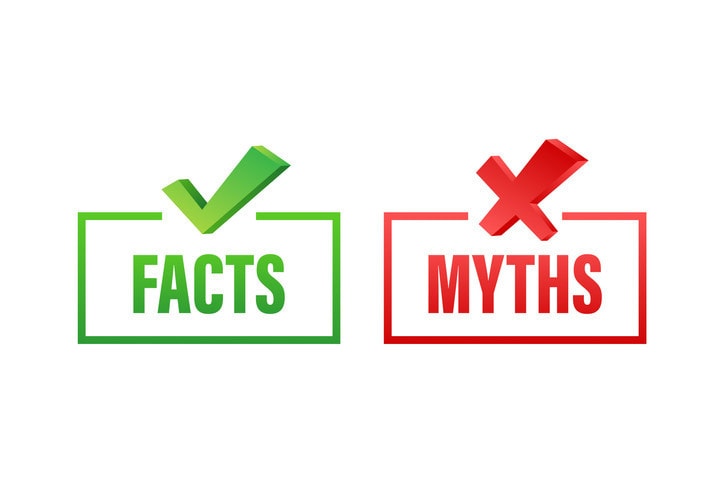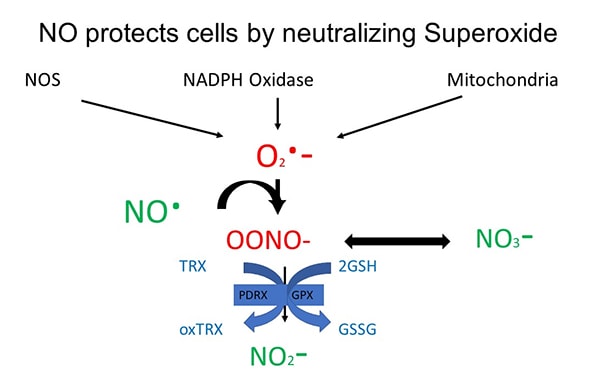The Biggest Myths About Nitric Oxide

As someone who has spent the past 25 years in science and research, I still find it humorous about what people say about nitric oxide and what products companies are selling as nitric oxide products. I felt it timely to debunk the myths about nitric oxide and nitric oxide products and set the record straight based on scientific facts.
This is critically important as there is so much misinformation out there and many so-called experts spread the misinformation. In many cases, I do not think this is intentional but rather sometimes people do not know what they do not know.
Furthermore, many companies have talking heads who have no experience or expertise in nitric oxide but, yet, they have influence and are educating at both medical and consumer conferences. As we move the nitric oxide field forward and there is more global awareness of nitric oxide, many more companies will start to make nitric oxide products.
I want to make sure you who are reading this, and all other consumers know enough to make informed and educated decisions on nitric oxide products which may be best for you and your family. Furthermore, there are still people out there saying nitric oxide is pathogenic and contributes to disease progression.
During my many lectures, podcasts, discussions with physicians and emails I get, even listening to others thought leaders on social media and podcasts, I find there are three myths that have been perpetuated in the nitric oxide field.
- Nitric oxide forms peroxynitrite and is toxic and damaging to cells
- Beets are nitric oxide
- L-arginine is nitric oxide
I will address each one of these myths by relying on scientific facts. The first may be technical and chemical for many people to understand but as nitric oxide becomes more popular you will hear the detractors mention this.
Myth #1: Nitric oxide forms peroxynitrite and is toxic and damaging to cells
Nitric oxide is a naturally produced molecule in the human body. It is a free radical, which means it has an unpaired electron in its outer molecular orbit. Nitric oxide likes to donate its unpaired electron to make it more stable. Some free radicals like oxygen radicals will steal electrons from nitric oxide and other molecules causing oxidation. Rusting metal is oxidation so oxidative stress causes us to “rust” from the inside out. A chemical reaction was modeled years ago whereby nitric oxide reacts with superoxide to form a molecule called peroxynitrite (ONOO-).
As shown in the illustration above, this molecule is same molecular formula as inorganic nitrate (NO3-), the same molecule found naturally in green leafy vegetables. This explains why and how nitric oxide is a potent antioxidant molecule because it neutralizes toxic damaging oxygen radicals. Some people argue since nitric oxide metabolites, including nitrotyrosine are always present in diseases, that it is causing the disease. This argument would be like blaming fire trucks on causing fires. Of course, nitric oxide is always present in pathology. It is the body’s attempt to heal itself.
Myth #2: Beets are nitric oxide
One of the biggest myths in the nitric oxide field is that beets are nitric oxide or provide nitric oxide. Everyone has seen the ads on TV for companies trying to sell you beets in different form factors and claiming it is nitric oxide. I have personally tested all the beet products on the market and almost none of them provide any nitric oxide benefit.
Firstly, the mechanism of action of beets as published in the scientific literature is due to a threshold of inorganic nitrate that must be present in beets. There must be at least 300-400mg of nitrate in beets to have a nitric oxide effect. Nearly all the beet products sold, even those advertised on TV, do not contain any detectable nitrate or nitrite so cannot, will not and do not provide any nitric oxide benefit. The most concentrated beet powders have at most 5-9% nitrate content. This means that you would have to consume 3500-6000 mg of this concentrated beet powder to achieve the 300-400 mg of nitrate.
Companies selling you capsules of beet obviously are poor at math since capsules typically only contain 700 mg in each capsule. Other form factors of beets in hydrated sugar matrix do not and cannot provide nitric oxide because of the same math problem.
The other major problem is that nitrate is inert in humans. Even if the beet products contain nitrate, the person consuming it must have the right oral bacteria to metabolize the nitrate into nitrite. With 2 out of 3 Americans using antiseptic mouthwash everyday and most people using fluoride toothpaste eradicating the oral microbiome, most Americans are unable to utilize nitrate and therefore get zero benefit from beets or nitrate-based products.
This pathway is also dependent upon the production of stomach acid to complete the nitric oxide production. We know there are more than 100 million prescriptions written for antacids every year in the U.S. alone and 2 out of 3 Americans use an over-the-counter antacid daily. Antacids completely block the natural production of nitric oxide and inhibit the utilization of nitrate to form nitric oxide.
Furthermore, beets are the third least liked vegetable in the world, contain high oxalates and cause urine and feces to turn pink or red. I cannot think of a less efficient delivery of nitric oxide than from beets.
Myth #3: L-arginine is nitric oxide
Products containing L-arginine and more recently L-citrulline have been on the market for more than 25 years. This was based on the fact that the nitric oxide synthase enzyme converts L-arginine into nitric oxide and L-citrulline is a bi-product. However, we are never deficient in L-arginine or L-citrulline so it makes no sense to supplement with these amino acids. In fact, this can cause harm in some patients. The VINTAGE study from 2006 demonstrated that patients receiving supplemental L-arginine had higher mortality. The results and conclusions from that study are below:
Results: Baseline characteristics, vascular stiffness measurements, and left ventricular function were similar between participants randomized to receive placebo or L-arginine. The mean (SD) age was 60 (13.6) years; of the participants, 104 (68%) were men. There was no significant change from baseline to 6 months in the vascular stiffness measurements or left ventricular ejection fraction in either of the 2 groups, including those 60 years or older and the entire study group. However, 6 participants (8.6%) in the L-arginine group died during the 6-month study period vs none in the placebo group (P = .01). Because of the safety concerns, the data and safety monitoring committee closed enrollment.
Conclusions: L-Arginine, when added to standard postinfarction therapies, does not improve vascular stiffness measurements or ejection fraction and may be associated with higher postinfarction mortality. L-Arginine should not be recommended following acute myocardial infarction.
Similar results were seen in a clinical study using L-arginine in patients with peripheral artery disease. Patients receiving L-arginine had significantly less benefit than those getting the placebo. The authors concluded “in patients with PAD, long-term administration of L-arginine does not increase nitric oxide synthesis or improve vascular reactivity. Furthermore, the expected placebo effect observed in studies of functional capacity was attenuated in the l-arginine-treated group. As opposed to its short-term administration, long-term administration of l-arginine is not useful in patients with intermittent claudication and PAD.”
So, with no benefit and potential harm, there is no reason to use products that contain L-arginine or L-citrulline. It is easy to identify companies who do not understand the science of nitric oxide because they will put L-arginine and/or L-citrulline in their products. Avoid these products and avoid other products from those companies. If they fail to understand the science of nitric oxide, they will not put a strong focus on science of their other products.
I do not take this lightly. We must maintain the integrity of the nitric oxide field and set the standard for safe and effective product technology. Companies out there marketing and selling products as nitric oxide that do not deliver nitric oxide can kill the entire field. If I do my job of educating the masses on nitric oxide, the science of nitric oxide, then consumers will no longer buy products that do not or cannot work and these companies will go away.
The companies spending the most money on advertising are typically the companies that sell products that do not work and do not understand the science. They continuously must acquire new customers because customers buy their products one time, they do not work, and they do not repurchase. That is why they must continuously market to you with advertisements for their fraudulent products.
The supplement industry is the wild wild west. A recent report showed that most supplements do not contain even what is on the label or more concerning contain substances not on the label. Nutrients are supplements are an important part of our health.
However, companies must be responsible and in how they market dietary supplements. Nitric oxide is a gas and not something you can take in a capsule or from beets. It must be produced inside the body. There are many good companies selling good products but leave nitric oxide to companies who understand the science of nitric oxide.
I ask that if you are looking for a nitric oxide product, trust our N1o1 line of products as your solution. If your body has lost the ability to produce nitric oxide, our products do it for you. Furthermore we repair the endogenous pathways so your body can naturally produce it again. There is no other technology like ours on the market. We make nitric oxide and we do it better than anyone or any company in the world.
You can find my nitric oxide products at www.n1o1.com. Use coupon code NSB10 for a discount.
—
Dr. Nathan S. Bryan is a biochemist and physiologist that has more than 20 years of basic science and clinical research. His many seminal discoveries have resulted in dozens of issued U.S. and International patents. He is an international expert in nitric oxide and molecular medicine. Dr. Bryan is an innovator and successful entrepreneur whose product technology is responsible for hundreds of millions of dollars in revenue worldwide. This content is not intended to replace medical advice from a physician.
Instagram @drnathansbryan
Twitter @drnitric
LinkedIn @drnathansbryan
www.drnathansbryan.com
https://www.youtube.com/@DrNathanSBryanNitricOxide
www.N1o1.com
www.bryantherapeutics.com

